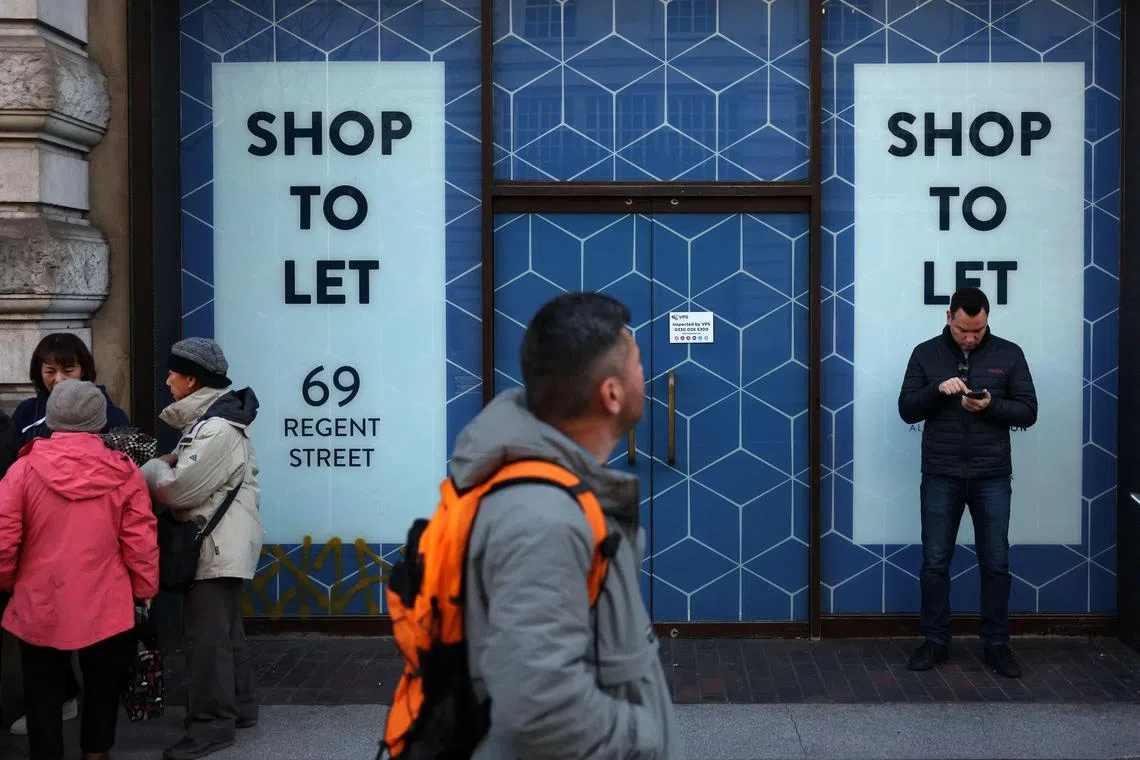Retailers turn to steep discounts to lure shoppers amid disappointing consumer spending
Sign up now: Get ST's newsletters delivered to your inbox

In Britain, the retail industry is still reeling from a disappointing Christmas season - the most critical period of the year for shops.
PHOTO: AFP
NEW YORK - On many weekends, dozens of people line up in a nondescript alleyway in east London to shop at sample sales: designer clothing offered at discounts that typically stretch to 70 per cent or more.
A few weeks back, while consumers were seeking bargains at a sale by luxury retailer Matches, solicitors were starting a form of insolvency proceedings for the brand. It came just months after it was acquired by British entrepreneur Mike Ashley’s retail empire.
Matches’ woes are the latest sign that retailers’ troubles are spreading across the Atlantic amid weaker consumer spending. Shops have been pushed to the breaking point after inflation boosted their expenses and weighed on consumer spending, and even heavy discounting is not enough to save them. Their difficulty comes after bumps that have included pandemic closures and supply chain snarls.
“Even the strongest and highest profile brands up and down the country are struggling,” said Ms Julie Palmer, a partner at consulting firm Begbies Traynor Group, referring to Britain.
She cited a “difficult macroeconomic environment, reduced discretionary consumer spending, higher interest rates and renewed supply chain challenges”.
The industry is still reeling from a disappointing Christmas season – the most critical period of the year for shops.
Total sales in Britain grew a mere 1.7 per cent in December, compared with about 7 per cent a year earlier, according to a report by the British Retail Consortium and consultancy KPMG.
It is a similar situation in the United States, where consumer spending started the year weaker than expected, while inflation was higher than forecast, helping explain the shopping pullback.
That contributed to defaults in the retail sector of the US high-yield bond market soaring past 5.4 per cent in the last 12 months, nearly double the 22-year average of 2.8 per cent, according to a March 1 report by JPMorgan Chase & Co.
Another common thread among the companies struggling today is their relatively narrow focus, said Ms Melissa Minkow, director of retail strategy at digital consultancy CI&T. “So much of this is speciality retail, and if you’re going to sit in a niche space, you have to do that better than anyone to both survive and thrive,” she said.
In the past several months, retailers Express, Big Lots, 99 Cents Only and more have all sought rescue financing or to restructure debt as sales lagged runaway expenses.
Joann in the US filed for bankruptcy protection last week, even after a pandemic boom in crafting lifted sales.
“Consumers’ budgets are strained,” said Mr Scott Friedman, chief credit officer at credit rating and consulting company Pulse Ratings.
Distress at budget chains is partly because the discounters’ core customers – low-income households – are cherry-picking what they purchase to save as much money as possible, he said.
“They are avoiding the discretionary items and buying only what they need – which carries a lower margin for the retailers,” Mr Friedman added.
Big Lots’ chief executive Bruce Thorn plans to focus more on “extreme bargains” to attract shoppers and stem losses.
At the other end of the market, Matches, which sells everything from a £490 (S$833) Burberry polo shirt to a £1,025 Loewe blanket, is returning to the Hackney warehouse early in April with another discount sale.
Fashion chain Ted Baker applied to start insolvency proceedings on March 26, even as retail sales in Britain came in stronger than expected in January. BLOOMBERG


